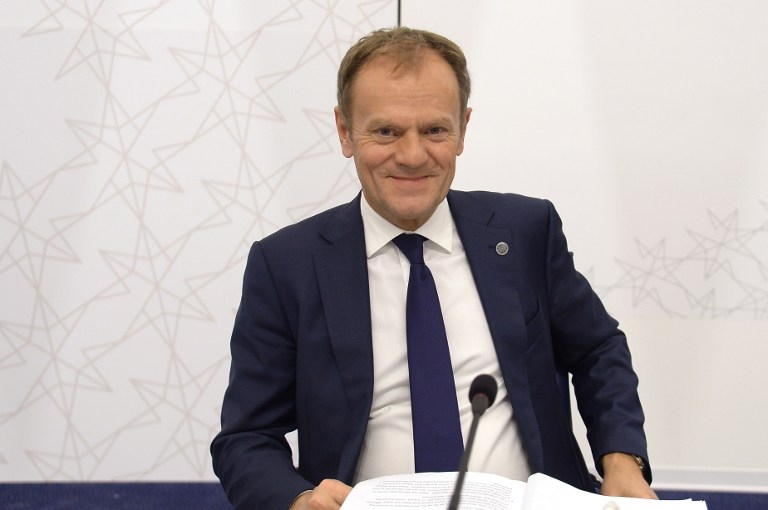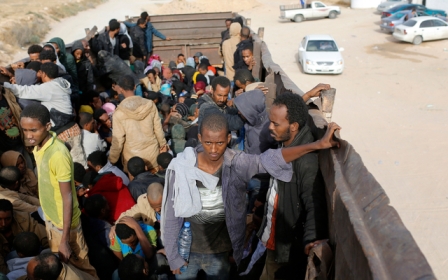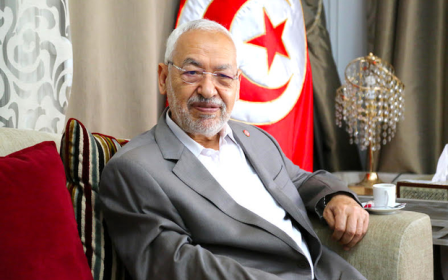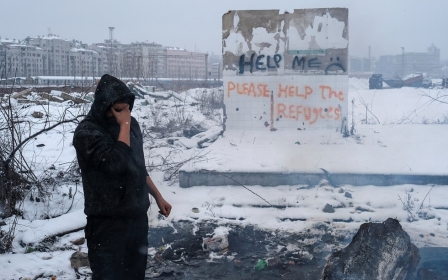Impatient EU looks for deal to 'significantly reduce' Libya migration

BEIRUT, Lebanon - European leaders have launched plans to push back refugees, asylum seekers and migrants to Libya, barely a month after a major UN human rights report warned that refugees face a "human rights crisis" in the unstable North African country.
Under new plans, Italy and the EU will train and equip Libyan coastguards ultimately to intercept boats before returning them to Libya, rather than European vessels taking them to Europe.
Human rights groups have fiercely criticised the proposals. On Friday, senior UN human rights experts warned that "limiting departures from the Libyan coast simply means accepting and legitimising the human suffering prevailing in Libya".
European politicians appear to be running out of patience as thousands of refugees and migrants continue to make the perilous journey from Libya to Italy each month. With winter soon over, thousands are expected to take to the seas. According to the Malta Declaration, a landmark document endorsed by the leaders of 28 EU member states at an informal summit on migration in Malta on Friday, that now needs to stop.
"With hundreds having already lost their lives in 2017 and spring approaching, we are determined to take additional action to significantly reduce migratory flows along the Central Mediterranean route and break the business model of smugglers," the Malta Declaration read, with EU leaders vowing to "step up our work with Libya as the main country of departure as well as with its North African and sub-Saharan neighbours".
According to an Italian-Libyan Memorandum of Understanding signed the day before the Malta summit, Italy will use around €200mn ($216mn) to fund and support Libya's coastguard.
The Libyan coastguard would return boats back to shore and, there, refugees, asylum seekers and migrants would be held in camps "until they are deported or they voluntary agree to return to their country of origin".
According to the agreement, signed by Italian Prime Minister Paolo Gentiloni and Libyan Prime Minister Fayez al-Seraj on Thursday, Italy would support camps with personnel and medical supplies for migrants.
Deals 'where possible'
Annually, well over 80 percent of arrivals in Italy come from Libya and at least 181,000 arrived in 2016, according to data from UNHCR. The crossing is notoriously dangerous, not least because smugglers often overload passengers on unstable rubber dinghies not designed to successfully make the crossing.
Already at least 228 people have died in the central Mediterranean this year, according to data from the International Organisation for Migration (IOM). More than 4,500 people died in the central Mediterranean alone last year.
As well as plans to bolster Libya's coastguard, the declaration recommends supporting local Libyan communities "where possible… to improve their socio-economic situation and enhance their resilience as host communities," while working alongside the UN refugee agency UNHCR and the IOM to "ensure adequate reception capacities and conditions in Libya for migrants" and promote voluntary returns amongst migrants present there.
"Where possible" reflects the unpredictable, fractious reality on the ground in Libya.
Question-marks remain about how Seraj's UN-backed government will successfully enact such ambitious plans when it is not in control of the whole of the country. Armed groups as well as smuggling and trafficking networks often easily navigate the spaces in-between.
Human rights groups are warning that plans to roll back EU search and rescue operations will effectively outsource saving lives, protection and even detention to a country that rights advocates almost unanimously agree is unsafe.
"The proposal to pull back EU naval operations from search and rescue activities and encourage - and indirectly fund - the Libyan coast guard to plug the gap, is a thinly veiled plan to prevent refugees and migrants reaching Europe," said Iverna McGowan, director of Amnesty International's European Institutions Office, in a statement on Thursday. "It will trap tens of thousands of people in [a] conflict ravaged country and expose them to the risk of torture and exploitation."
McGowan added that the lack of any "tangible details on resettlement or on safeguards for migrants and refugees trapped in an essentially lawless country betrays the mean-spirited intentions behind this cynical proposal".
Libya is not a signatory to the 1951 Refugee Convention and the Italian-Libyan memorandum does not detail any obligations for Libya to advance commitments to human rights safeguards or international law.
'Executions of countless migrants'
Conditions in Libyan detention facilities, some of them controlled by non-state armed groups, are notorious. Last week, a report sent by the German Embassy in Niger to Berlin documented "executions of countless migrants, torture, rapes, bribery and banishment to the desert on a daily basis".
Supposedly partners to the new plans, UNHCR and IOM released a joint statement on Thursday bemoaning "deplorable conditions" for migrants in Libya and similarly argued it is "not appropriate to consider Libya a safe third country nor to establish extraterritorial processing of asylum seekers in North Africa".
Despite these criticisms, EU officials appeared encouraged after the Malta summit.
Speaking at a joint press conference on Friday afternoon, European Council President Donald Tusk said EU member states had "agreed on immediate operational measures that should help reduce the number of irregular migrants and save lives at the same time".
"We welcomed the Memorandum of Understanding signed yesterday by the Italian and Libyan prime ministers as another important and encouraging sign that things are about to change for the better," Tusk added.
Director of the Brussels-based Migration Policy Institute Europe, Elizabeth Collett, told MEE that Friday's plans reflect a "growing political consensus in Europe" that intercepting boats at sea and processing passengers' asylum claims on European soil is "facilitating and fuelling a smuggling industry ... benefiting from the fact there there is this search and rescue".
"You can't stop search and rescue - that would be appalling. [But] if the Libyan coastguard is 'pulling [boats] back' to the Libyan coast, then you have prevention of loss of life at sea and then also no legal responsibility for asylum claims that then have to be decided by the EU," said Collett, explaining the European rationale behind the plans.
But with often abysmal detention conditions and a lack of any viable protection system back on shore, refugees, asylum seekers and migrants potentially face dire, uncertain futures if returned.
"You're not necessarily guaranteeing someone's safety," added Collett. "You may be guaranteeing them safety from the risk of drowning, but then what happens to them after they get back to Libya?"
The EU is also trying to involve third countries that neighbour Libya - namely Algeria, Egypt and Tunisia - in the plans; Friday's Malta Declaration recommends enhanced "bilateral cooperation".
Returns
Those proposals might also include external asylum processing centres in third countries in the southern Mediterranean, an idea that has been proposed and re-proposed by EU member states for years.
In December, Der Spiegal reported that Germany’s Ministry of Interior is proposing to deport “refugees from Africa” to a Tunisian detention centre close to the border with Libya, “with the possibility to [then] apply for asylum in Germany or other EU countries.”
Collett suggests that partner countries may take some convincing “that it’s in their benefit to host a camp like that on behalf of the EU.”
"It might look neat on paper," she said, "but in practice no-one has really cracked how to do that."
Regarded as stable and more in control of its northern coastal borders, Egypt makes sense as a future partner and is already due to receive €11.5mn ($12.4mn) in development funds to support local host communities and displaced communities within Egypt.
However, Ayman Zohry, a Cairo-based Egyptian expert on migration studies, suggests though that it "goes against Egypt's policy direction," which is more focused on Egyptian migrants, regular or irregular.
"Cooperation with the EU could be strengthened, of course ... [but] historically, Egypt is against refugees camps and detention centres for irregular migrants in Egypt," Zohry added.
The asylum and migration programme officer at EuroMed Rights in Paris, Marie Martin, meanwhile told MEE that aside from external processing centres, European countries are pushing hard to "classify [third] countries as safe countries of origin".
That could potentially allow refugees, asylum seekers and migrants to then be returned to these countries.
"Algeria, Tunisia and Morocco are very much looked at by countries like Germany that they should be listed as safe countries of origin. The way I interpret the reference to 'bilateral cooperation' with Algeria, Egypt and Tunisia is exactly that; it's a direct reference to the need to have those reception centres."
Either way, the Malta summit has sent a precedent, Martin argues.
"There's not even a willingness to hide or wrap this up in nice human rights wording anymore," she said. "The EU finds itself very legitimate in its claim to just 'fence off,' and it imposes this on other countries at the expense of human rights."
New MEE newsletter: Jerusalem Dispatch
Sign up to get the latest insights and analysis on Israel-Palestine, alongside Turkey Unpacked and other MEE newsletters
Middle East Eye delivers independent and unrivalled coverage and analysis of the Middle East, North Africa and beyond. To learn more about republishing this content and the associated fees, please fill out this form. More about MEE can be found here.




